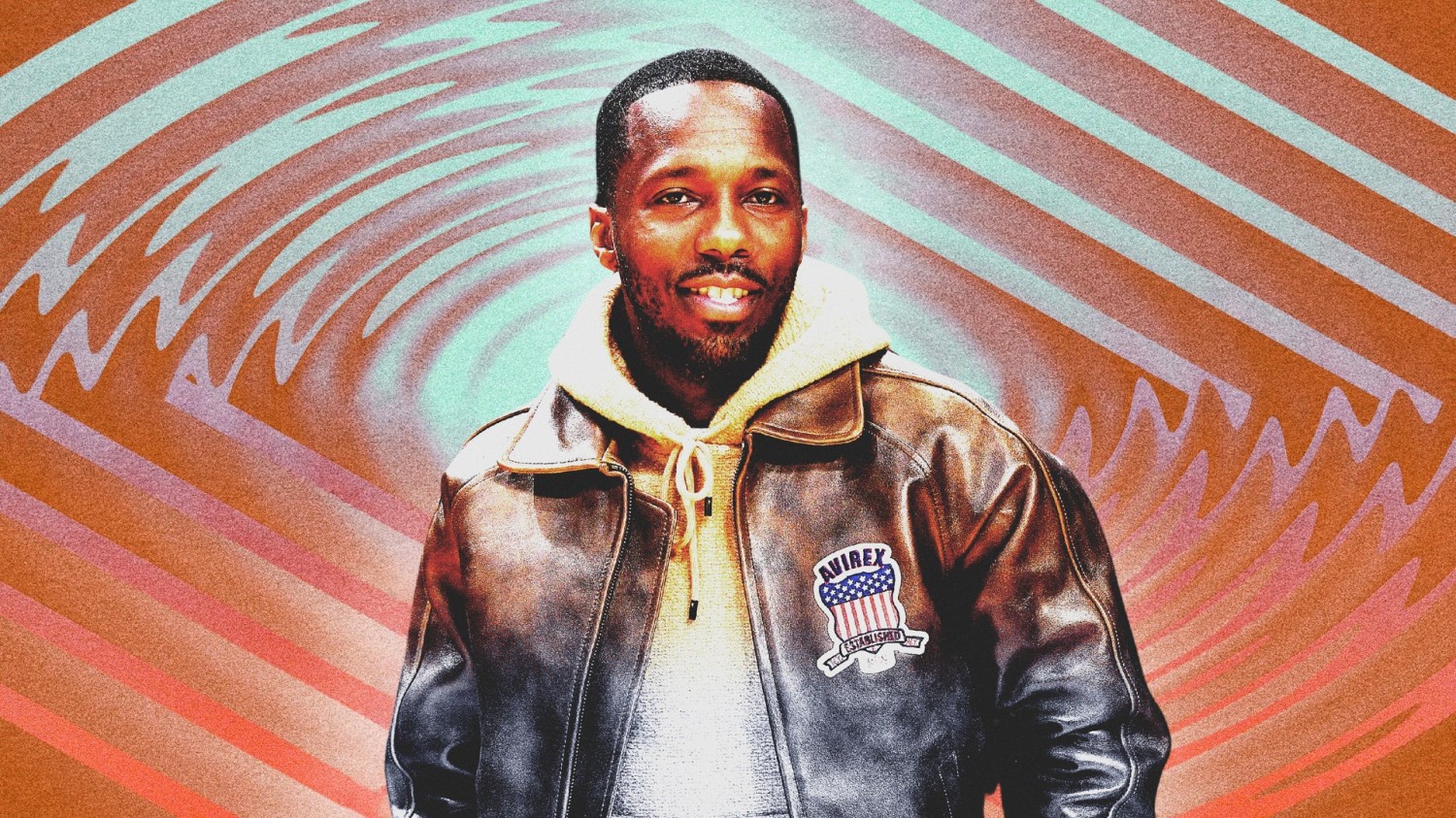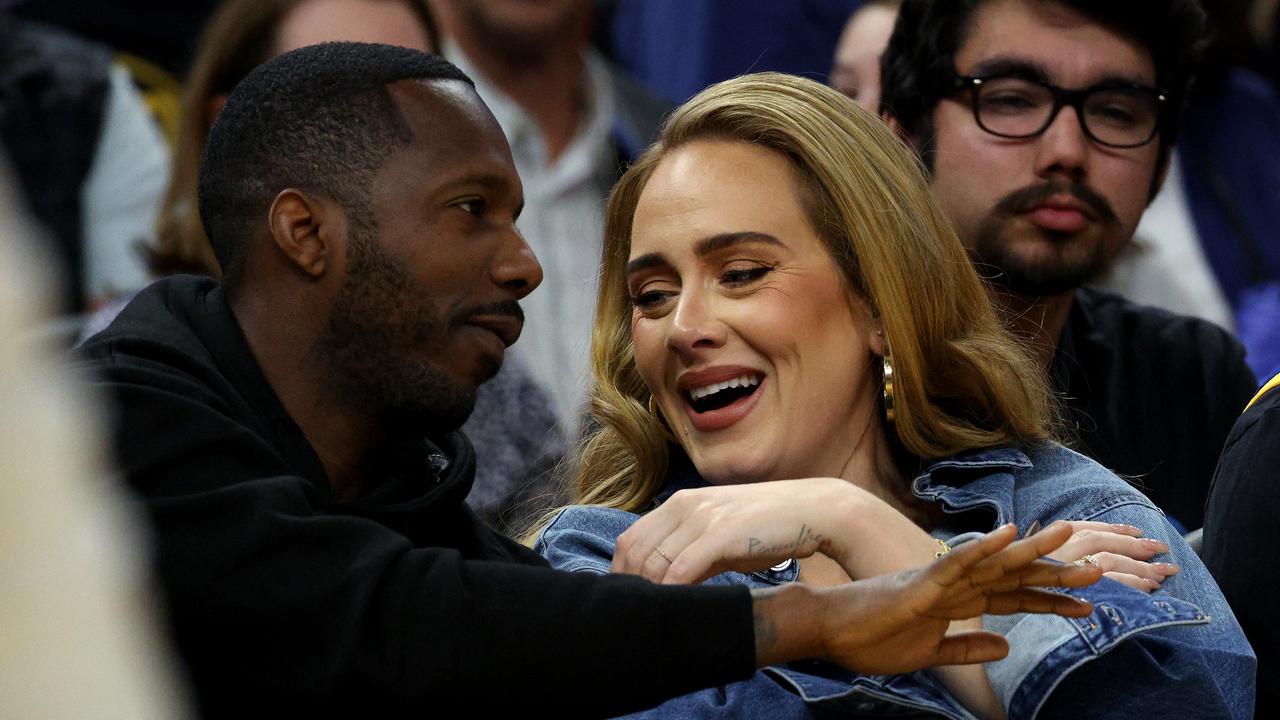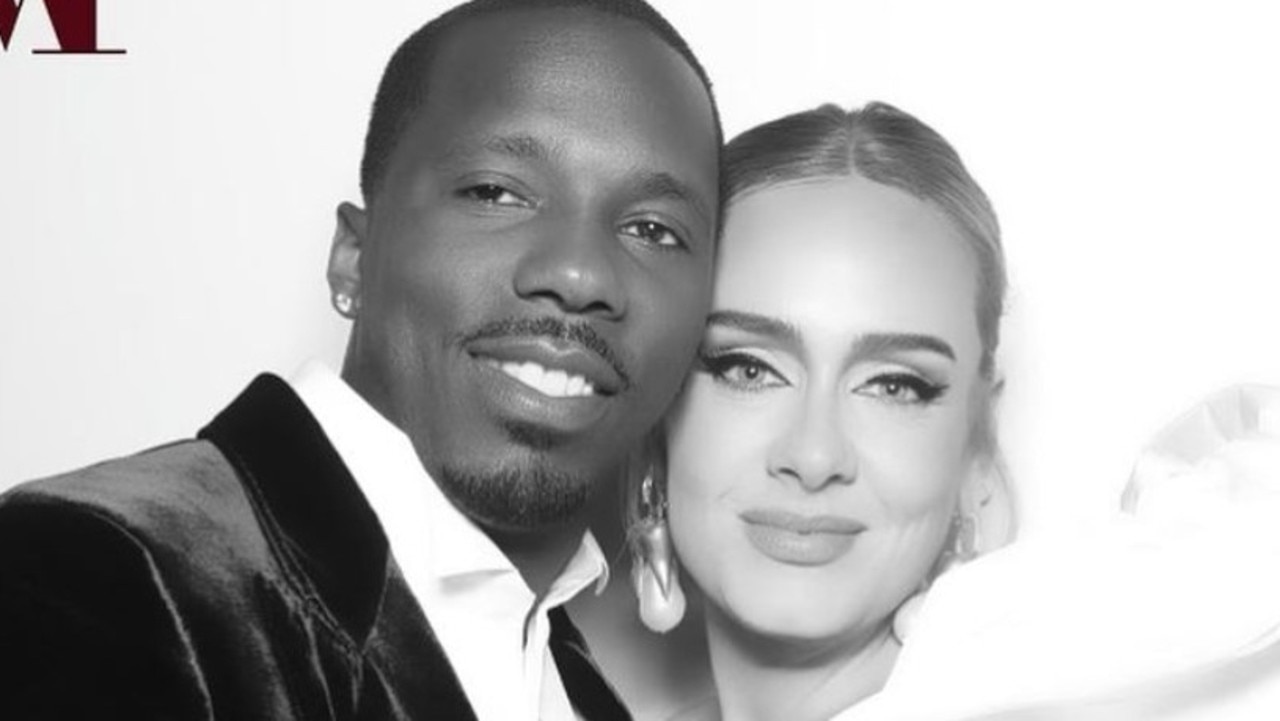This article is more than
1 year oldRich Paul on Empowering Athletes and Learning From Adele: “Life Is Good”

|
You can count the number of books written by sports agents on one hand. And you can count the number of good books written by sports agents on Captain Hook’s hand. (The pointy one.) Earlier this month, Klutch Sports founder and CEO Rich Paul joined the latter group with Lucky Me, a sharp, honest memoir (written with Jesse Washington) detailing his upbringing in Cleveland—everything, basically, that happened before he met a teenaged LeBron James at the airport in Akron, Ohio. What Paul has done in the years since is the stuff of modern sports legend: he spent a few years doing a little bit of everything for an early-career LeBron before deciding to become an agent, spending a few unproductive years at CAA before launching Klutch (with, of course, one particularly high-profile client). And Paul, 41, has built Klutch into a powerhouse, establishing it as perhaps the premiere agency of the NBA’s player empowerment era—the agency you sign with if you’d like a greater say over where you play next. (Hollywood agency UTA acquired a stake in 2019). And he’s done it all in a style all his own: Paul is the rare agent with a sneaker collab, and certainly the only one in a relationship with Adele. That’s because, as he explained to me over lunch at Klutch’s Beverly Hills offices recently, he doesn’t much care for the traditional rules that govern a job like his. “I think you have agents, and then you have businessmen,” he said. “I’m a businessman. I’m not an agent. And that’s no knock to agents, because I do wear an agent hat at the time I need to wear it. But I’m not on the phone talking to clients about nothing and pretending to be important. That’s not what I do out there.” GQ: In Lucky Me, you write about the importance of discipline and consistency in your own life. What’s something you make sure to do every morning? Paul: Pray. I try to say a prayer every morning and every night, but obviously depending on what's going on around that time. But it's pretty consistent across the board. I've been saying the same prayer since my mom taught me how to pray. It starts with, “Our father.” How about self-care, or exercise?I started meditating a little bit. I get in the sauna. I get in the cold tub. I work out every morning. What got you started meditating? Sometimes people come to it because they’re curious. And other times, they’ll have a friend who’s like, “You know, you should do this.”I have a few friends. Not, say, a client who works with a big meditation app?No. No, it wasn’t him. No. It’s mainly getting some time to yourself. Because we work a job where it’s about everybody else, pretty much. Right. You’re in service to your clients. But it’s also not exactly a conventional office job. You are available all the time. Was that ever a difficult adjustment for you?Yeah. Because I came from a place where I made my own schedule pretty much. But organically, over time it started to happen. [Growing up] I realized school is really about habits. You got to be to school before the bell rings. You got class, then you do your homework after class or when you get home. So I started developing these habits where, as soon as I got home, I would do my homework. And I talk to my son about this right now: Don’t wait, do it while it’s fresh on your mind. So it wasn’t like I discovered something. It was just that I didn't have a job, per se, where I had to really punch a clock. Didn’t mean I didn't have scheduling, because my schedule was like, “Oh, I got to take my clothes to cleaners. I’m going to get me something to eat. I'm going to go to the rec and play from 1:00 to 3:00.” Once I was able to build my business, I was never really an office person because at heart, I'm a creative. So I like to move around and be into things. And then when I started embracing the office and the calendar, my day just changed. And so now it's hard for me to not be in the office. If I'm in LA, I'm in the office. When you were a kid, what did success look like for you?Man, it varied, right? Success was, like, going outside and there's actually people outside to play with. And then going outside, and we play a game of football, and I score a touchdown. I felt like I was this superstar on my street. We used to make these cardboard belts, like wrestling belts, but you would carry the belt if you were the intercontinental champ in street football. That was success. And then some days success was just having something to eat, man. Because my life and my days were a rollercoaster. You could have four hours where you feel like the Fresh Prince of Bel-Air, and you can have 20 hours where you feel like the loneliest kid in the world. One of the things you write about is growing up in a world where it wasn't always easy or encouraged to take the long view of success. When did that start to come into focus for you?It gradually started happening over time. Honestly, I just started to really be okay, like, breathing, in 2019. I felt like I had positioned myself enough by then to where I knew how to build a business, I had success building a business, I had a very holistic understanding on what success look like. I felt that I now had clarity on business. There’s this great scene in the book of you, as a kid, ironing your bankroll. You’re 11 years old, winning thousands of dollars gambling. Literally ironing dollar bills, straightening them out, crisping them up. How has your relationship to money changed over time?I'm happy that I got to know money at a very early age. It's all relative, because I handled money a lot as a young kid. And handling $10 at five years old, it is no different than handling a million dollars at 25. And I was happy that I was around what, at the time in my world, was a lot of money. Cash was prevalent. I seen my dad count. I gambled. I seen everything with money, money, money, money, money. I had this business perspective at a very early age. Everything was business. Everything was a bet. And so my perspective was much more business than it ever was play. I wasn't a kid that horseplayed. I wasn't a kid that played video games. Everything I did for the most part, outside of sports, came with a transaction. Even in sports, I wanted to get so good to where if somebody ever betted me, I had the ability to win. That's really what it was about. And people used to bet on me as a kid. You write a lot about loving gambling—sometimes loving it too much. Are you more or less of a gambler now than you were growing up?Way less. First of all, how and where I like to gamble, I can't go there like that. It's not ideal. It's not safe. It's not a number of things. Not just for me per se, just in general. And what's the ideal Rich Paul gambling scenario?It's a dice game. Anywhere in the world.Think you still got it? Hell yeah. I would love a great dice game, amongst gentlemen though. Not the world I come from. Money appears in your book often next to style, or fashion, or self-presentation. And I think you make a really compelling case in the book for why those aren't frivolous things. How have you carried those lessons with you into your professional life?If I walk in the boardroom tomorrow, everything matters. My haircut, my watch, what I decide to wear, my cologne, everything matters. And you'd be surprised, because oftentimes you may be in a situation where it's not the person that you're looking to give a comment that actually gives a comment, and raises the awareness to the person that you actually are looking for the comment from. Not that I'm looking for it, but most people are. Maybe your wife says, “Sam, that guy was really dressed really nice. Wow. Love that sweater.” Now the perception of me to you changes. So I've always been that type of person. And as far as I can tell, you're the only agent who has a signature shoe. That doesn't hurt, I bet.Most agents aren't cool. You don't have to be afraid to say it. Why aren't most agents cool? Or why did it take so long for someone like you to come around and show that that's a thing you could do successfully?Well, having that connectivity, that relatability, you’re born with that. It is also a part of your development. So where I came from, my NBA season, was getting fly every day. Every single day I had to have it on. I wanted the best of the best. When I was young, if I had $700 to my name, I'll spend that whole 700 on one sweater. Again, we didn't have much, but that was the one thing that I could hang my hat on. One thing I can control, I'm going to control, and that's how I look. I was never afraid to take risks. I was never afraid to spend it all on one item. I was wearing $200 T-shirts in '95, '96. I didn't even know we were doing that then.Coogi made what they called a T-shirt. But they used to have a hat to match, had that, the hat was like $135 back then. I was wearing Moschino and Iceberg and Versace, all that type of stuff back then. I wasn't afraid to spend the money. I spent the money. I had every shoe. That was what I was known for, having every shoe. And that became part of my legend, so to speak. Tell me about when you decide to actually become an agent.It's, like, 2006 or '07 where I started thinking that's what I wanted to do. Because the first couple of years you're with LeBron, he's like, “We'll figure out a job.”Yeah. And then I landed there because I had an ability to cultivate relationships with players, but I also knew the game. I like to talk sports. But when I started to pay attention to what agents actually did, that's when I was like, “I could definitely be an agent.” But then that changed as well. I was like, “No, I want to be this type of agent.” When you say “this type of agent,” what do you mean?I didn't just want to be an agent. I didn't want to be somebody that's walking on eggshells or tiptoeing around a client. Lying to their family, telling them what they want to hear, which is what most agents do, pretty much. Not all, but most. And I also didn't want to just look at it as a job. I wanted to make sure that I was adding value to those that appreciated the value, because everybody don't. But for me, I always felt like it was all or nothing for me. Especially in this space, because being an athlete, it's like coming down that river and you can't see the waterfall ahead of you, but it's there. That's what happens to their careers. And so I'm like, “Man, I don't think it's right that these people in our industry, they're actors, they're pretending.” And then the player, they're not learning anything. What's the sense of making a ton of money and—forget not knowing what to do with the money, you just don't know what to do, period? You don't know how to evaluate, equate, enter conversations. You're talking about skills that you should have, or a player should have?No, just a person. They're people first. They're not players, they're people. So I took it as disrespectful. I'm saying to myself, “Oh, these people, they don't respect these guys enough to want to educate them.” And then also I started to pay attention. I'm like, “Well, damn, they actually can't do the job because they're not really that educated.” Their toolbox is pretty small in terms of life. I started to really evaluate all those different talents. You could be educated—book smart—but that's not the end-all, be-all at all. Especially textbook smart. That's only going to get you so far. So I just started to realize, “Oh, I can carve out a real niche.” Right. And so you go and spend four or five years at CAA, “learning the ropes.”Learning nothing. You told The New Yorker a couple years ago that you learned nothing there. Tell me about that experience.I didn't learn anything. I wasn't lying. And it's because there was no plan for me. It wasn't like somebody was sitting around saying, “Let's invest in Rich and let's make sure he becomes this unbelievable agent.” No, they were nice to me because of who I was aligned to. There wasn't no real belief that I could become who I am today. And I knew that going in. And I'm sure that tells you something about the challenges facing someone from your background, who isn't aligned with who you're aligned with, when they see an environment like that.Of course—there's no chance. And I'm sure that informs the way you run your company, too.Yep. There's very little opportunity for someone that comes from my background in that business, especially back then, that weren't aligned with somebody. Today, I made them perceive people differently. And now as they're hiring, they look at it more so now as an asset. It's an asset to have a cool, young, Black kid in your business now. Today, they may look for it to be an asset—but they're still not an investment. This is your 22nd year working in basketball. What's the biggest change you've noticed in your time around the NBA?I think players are starting to make their own decisions sooner. I mean, this feels like something you've kind of had an influence on.Maybe, but I also think there's an abundance of parents that are comfortable in their own skin, and that truly want what's best for their kid. They're not trying to get nothing from the situation. They just want their son to be happy. They're allowing the kid to make the decision. They're involved, but they're not overly involved. I don't know if I had a hand in that. But when you talk about players making decisions for themselves earlier, someone like Anthony Davis comes to mind, right? You, AD, LeBron, you’re all associated with this idea of player empowerment. That's what comes to mind when I think about what you're talking about.I think it's just coming from education, though. And you’re saying, it's not like you gave them the power. You're just helping them figure out how to use it.You're educating them. There’s more information out there. Most guys aren't going to want to ask you something because they don't want to look dumb. There's no such thing as looking dumb. You look smart by asking something that you don't know. That's the smartest thing in the world. The dumb thing is pretending to know something you don't know. That's pretty dumb. How do you think about leverage in your job? Leverage is scarce. And I think people don't really know how to identify what leverage actually is. You got to be careful with that. Sometimes your ego tells you that your talent is your leverage, and it's not. Your ego is your leverage governor, in a lot of ways. And your ego can cause you to floor it at a time where you should be parking. This is going to sound like a silly question, but do you think you would be a better agent, worse agent, or the same agent if you were six-foot-five?I wouldn't be an agent. I probably would've been playing overseas. I'm good enough to shoot the ball in the NBA at six-five for sure. But I lack so many other skills. Do you know what I'm getting at, though? I think there's something in your character from growing up a little undersized. That you noticed things, and you learned things, that benefited you as an agent.You know what it was? The thing that benefited me as an agent most, more than anything, was being a role player on my high school basketball team. Because I know the little things that it takes to be a part of it. The ability to be a star is only suitable for a small amount of people. There's thousands of roles. There's only so many movie stars, but there's thousands of extras. There's thousands of co-stars. There's thousands of people who played like, “I know that guy! He got several different roles!” Be That Guy.Be that guy. Nothing wrong with being that guy. And if you're able to develop and you become the star, then so be it. And on my high school team, I got to understand that yeah, I'm not the star on the court. I'm the star off the court. Part of my job was helping the other guys. I was a team guy. I didn't pout that I didn't get in the game. When I did get in the game, I was appreciative of it. Say whatever you want, think you should have played more minutes or whatnot. But that wasn't the case. If my name was called, I'm going to step up to the plate, do what I need to do. It helps me today—I have these conversations all the time. I just had a conversation with Darius Bazley. Like, “Man, you're trying to make the team, bro. You got to always be early. You got to always stay late.” I think it also allows me to stay grounded. I did a lot of things coming up as a young kid that I got a lot of friends who ain't around for doing. I live a different life today, but I have a clear understanding of where I came from. I haven't forgotten that at all. I'm still in touch with that. There's a part of me that wishes I could bring everyone with me, but I know it's not realistic. The unfortunate thing is, and this is what I talk about in Lucky Me, I grew up with people that could thrive at Stanford Business School, Harvard Business School. We had to resort to the activities within our environment because that was what was available to us. And society would say, “Oh, you guys had other options.” Really? You go do that. So I don't glorify it, but I'm not shameful either. I will also say, I think living in Los Angeles, running your business would probably be more fun than playing pro ball in Turkey or something.Oh, absolutely. No, no, man. I'm having a lot of fun. I enjoy it. Yeah, I enjoy it a lot. To go back to to idea of leverage, I feel like the big story of the offseason is seeing Damian Lillard say, “I want a trade and I want to go to this one team,” and seeing James Harden say, “I'm going to opt into my contract, but I also want to be traded and I'd like to be traded to this one team,” and then seeing neither of them get what they want. What do you make of that shift? I feel like we were in a moment where players were asking for more and then getting more. And now it seems like we're maybe hitting a little bit of a wall. How do you see that professionally?It's hard to ask for something with four years left on your contract. I had that same conversation with Ben Simmons. It just wasn't necessarily being understood at the time. It's difficult to do that, man. And I can't knock somebody for wanting to change. Only they know the reasons why. But in our business, there’s a time where that actually would make sense. But Dame got what he wanted, too. Obviously he didn't go where he said he wanted to go. But Dame's a professional and he's a hell of a ballplayer. For whatever reason, he had in his mind that he wanted a change. The same with James. Their business is not my business to get into. But at the end of the day, there has always been player empowerment. But player empowerment should be a player saying, “I'm going to look at my position, and I'm going to focus on doing my business how I want to do it. I'm not going to stay with one team just because Reggie Miller did.” So player empowerment is really player choice. Players before didn't know they had a choice. But don't get it confused with them actually having the power to write their own check, or commit to something and then get out of it just because they say they want to. That's not true. When one of your clients comes to you and says, “I want to make a change. I want to go somewhere new,” how do you handle that conversation?Well, first thing is why? And the second thing is understanding that you’re actually wanted. Because, you can't want to go somewhere without being wanted. So in Dame's case, yeah, he wanted to leave based upon where the organization was going. The organization probably should have wanted him to leave, because look what they was able to do [in terms of the return in a trade]. And he was also wanted. You got to be wanted. Kids like, “Oh, man, get me out of here.” To go where? I would imagine that, however many times we've seen you helping a player handle a trade request, there are as many times that we don’t see where you're talking someone down.You do that a lot. But look, it happens. I'm just totally honest with guys. And by the way, the feeling is mutual. If you feel like you’re tired of their shit, they’re probably tired of your shit, too. And at the right time, we'll go somewhere different. I got a player coming up that I'm sure will probably be traded pretty soon. They just paid him a whole lot of money. But you could feel the environment getting a little thin. You could feel the excitement amongst each other getting a little thin. And so you know that's coming. Now, I wouldn't be doing my job if I didn't ask who that was.He plays in the Midwest, that's all I can tell you. So you also have a partner who’s tremendously successful.Which one? The one you're in a relationship with.Female partner. Can I ask, by the way—are you married? Because I've seen you being referred to as a husband.Life is good. What do you learn from being in a relationship with someone who is incredibly successful, at the top of her field?Anytime you're in a relationship with someone that's successful, I think you try to pay attention to what makes them successful, outside of their talent. Look at their habits, look at their details, look at their passion. Look at what drives them. Now creators are different because they can be, but when they're in that moment, I think it's important to pay attention to those details. I personally don't get into my personal relationship, so I don't like to talk about that. I will say there are things that you should pick up on that's obvious for me, but I keep that to myself. One of the things you talk about in the book is your struggle to be vulnerable. Being hardened or paranoid is in its own way a totally reasonable response, and maybe even useful for business, too. So I'm curious how that personal journey expresses itself.It's helped me. I've grown in that space, thank God. Because growing up, you couldn't really exude any vulnerability, and it kind of stunts your growth as a man, because you don't learn how to love properly. You become very closed-minded to things. Everything is rough. Everything is matter-of-fact. And it's necessary to get home. Because, again, a lot of days you spend in the streets, you're just trying to get home that night. So if it takes that to get home, then that's what you do. In this life, it's different. That mentality helps me in my everyday job, because I have an it-is-what-it-is energy, a whatever's-going-to-go-down, it's-going-to-go-down type of energy, which is helpful, especially when you're in a negotiation. Because he who cares least, wins, right? From a great former partner of mine. But at the same time, when you're building a business, when you have young people working within your environment, when you are in a position I'm in, and you have to have an open mind and more importantly, an open ear to listen to other people, it becomes not about you at all. It really becomes about them. And so allowing yourself to be vulnerable, allowing your ear to grow, allowing your heart to be less black and have a little color to it, it's helpful. Sam Schube is the director of GQ Sports. |
Keywords
Newer articles




